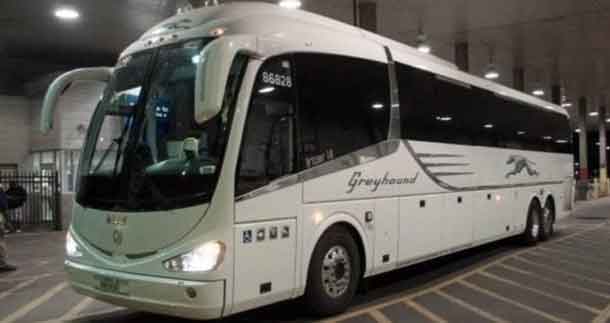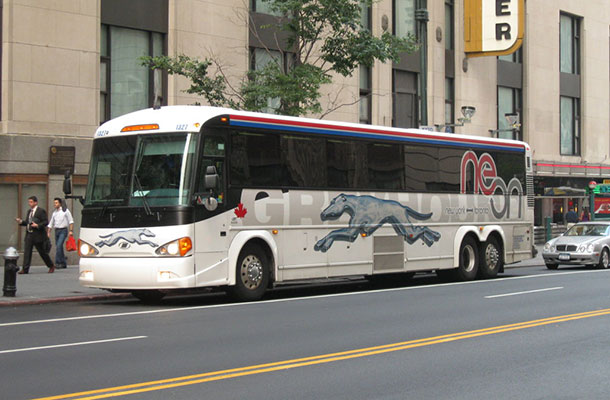 OTTAWA – Greyhound Canada will no longer offer service from Sudbury Ontario west. This move is being stated by Greyhound as needed due to a lack of ridership and the reduced revenues.
OTTAWA – Greyhound Canada will no longer offer service from Sudbury Ontario west. This move is being stated by Greyhound as needed due to a lack of ridership and the reduced revenues.
The Government of Canada states that “Access to affordable, publicly available transportation options is necessary in a country as vast as Canada. Whether it’s taking a bus to see family or friends, travelling for work or going to medical appointments, Canadians need options for transportation”.
“The elimination of Greyhound Bus services in Western Canada and Northern Ontario will affect many Indigenous communities. These routes are critical for community connectedness and the safety of Indigenous women and girls. That is why the federal government will be engaging with Indigenous communities to support those impacted by bus service cancellation, as well as supporting community-led solutions including new economic opportunities such as Indigenous-owned transportation businesses. Additionally, I want to assure clients of the Non-Insured Health Benefits program that medical transportation services will not be interrupted and that officials from ISC are working directly with communities to ensure that good options are available,” states Jane Philpott, Minister of Indigenous Services.
In Northwestern Ontario, the former Liberal provincial government announced support for the expansion of bus services, Ontario Northland and Kasper Transportation are seeking to fill the void in the marketplace left by Greyhound.
The federal government with ministers, Marc Garneau, Minister of Transport, Jane Philpott, Minister of Indigenous Services, and Dominic LeBlanc, Minister of Intergovernmental and Northern Affairs and Internal Trade are welcoming interest voiced by private sector transportation providers in taking over many of the routes in Western Canada and Northern Ontario which Greyhound Canada will discontinue serving effective October 31, 2018.
While this will provide continued bus service that will cover 90 percent of the affected areas, some gaps remain where other transportation options do not exist. The Government of Canada recognizes the significance of Greyhound’s sudden reduction in bus services for many Canadians, especially for seniors and those in Indigenous communities, rural and remote communities.
In Manitoba, Grand Chief Arlen Dumas states, “The federal government should support First Nation companies that are offering this vital service. First Nation citizens rely heavily on bus service to get to medical appointments and to attend post-secondary schools in the north. Access to healthcare and education are Treaty rights. It will take time for the companies taking over services left by Greyhound to iron out kinks and begin to run smoothly”.
“This is a vital service that should not be disrupted,” continued Grand Chief Dumas. “First Nations citizens need reliable bus transportation for a variety of reasons, including being able to access medical services in urban centres. With First Nations companies rising to the challenge of providing safe, reliable services, we would hope that all levels of government work with our First Nation leadership and communities in order to support these economic development opportunities while providing our citizens with the basic right to transportation, particularly our northern relatives.”
Federal Liberals Looking to Assist
The Government of Canada is prepared to assist affected provinces in determining the best path forward and is open to considering avenues towards finding effective solutions. Ministers have directed that work continue with provinces to continue to assess coverage by new transportation providers. If provinces determine that there is a need to address gaps in Greyhound service caused by this week’s discontinuation of bus service, the Government of Canada is open to considering providing provinces funding support on a cost-shared and transitional basis.
Additionally, the Government of Canada is engaging Indigenous communities to provide additional support for Indigenous-owned transportation companies, through existing programming, such as the Aboriginal Entrepreneurship Program, so they can take up opportunities to provide business solutions to their own affected Indigenous communities.
The economic regulation of interprovincial bus carriers has been led by the provinces and territories since the 1950s, under the Government of Canada’s Motor Vehicle Transport Act. This has included establishing conditions of entry or exit, and regulating rates and routes of interprovincial bus carriers, and providing targeted funding in some instances. Working group of officials from federal, provincial and territorial ministries of transportation and highways have been working since July 2018 to better understand the impacts of service reductions on jurisdictions and develop solutions.
Federal, provincial and territorial governments will continue collaborating to explore innovative, longer-term solutions to address the transportation needs of Canadians, focusing on emerging technologies, alternative service delivery models and more flexible regulations for bus service providers.
“I am encouraged by interest that has been voiced by private sector transportation companies in taking over the routes that will no longer be serviced by Greyhound Canada. I am keen to keep working with provinces and territories on finding solutions. I look forward to a positive outcome that will meet the transportation mobility needs of Canadians,” says Marc Garneau, Minister of Transport
“The elimination of Greyhound Bus services in Western Canada and Northern Ontario will affect many Indigenous communities. These routes are critical for community connectedness and the safety of Indigenous women and girls. That is why the federal government will be engaging with Indigenous communities to support those impacted by bus service cancellation, as well as supporting community-led solutions including new economic opportunities such as Indigenous-owned transportation businesses. Additionally, I want to assure clients of the Non-Insured Health Benefits program that medical transportation services will not be interrupted and that officials from ISC are working directly with communities to ensure that good options are available,” states Jane Philpott, Minister of Indigenous Services.
“By working together, federal, provincial and territorial governments will explore and develop new and innovative solutions to help meet the transportation needs of Canadians. Our government’s ongoing collaboration will support the development of long-term options for communities in need.”
The Honourable Dominic LeBlanc
Minister of Intergovernmental and Northern Affairs and Internal Trade
Quick facts
- On July 9, 2018, Greyhound Canada announced it was discontinuing all remaining intercity bus services west of Sudbury, Ontario, by October 31, 2018, a network of over 11,000 route-kilometres affecting 583 stops and up to 2 million passenger trips per year, according to the company.
- Greyhound Canada’s discontinuation of services could disproportionately impact vulnerable groups in rural areas, including Indigenous communities.
- Officials from federal, provincial and territorial ministries of transportation and highways have been meeting weekly since July 2018 to better understand the impacts on jurisdictions and determine viable solutions for Canadians.






